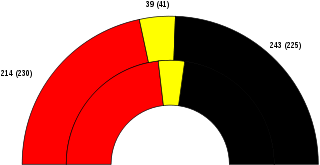
German federal election, 1976
Encyclopedia
The 8th German federal election, 1976, was conducted on 3 October 1976, to elect members to the Bundestag
(parliament) of the Federal Republic of Germany.
- the party's candidate for Chancellor. CDU and CSU tried to achieve an absolute majority of the votes to make CDU chairman Helmut Kohl
Chancellor.

as Chancellor. Between the "sister parties" of CDU and Bavarian CSU there emerged a critical conflict, as the CSU leader Franz Josef Strauß
wanted to break both the united Bundestag group of the parties and the agreement not to compete against each other in any Land. Later, this attack was withdrawn, while Strauß became candidate for chancellor for the 1980 elections.
Bundestag
The Bundestag is a federal legislative body in Germany. In practice Germany is governed by a bicameral legislature, of which the Bundestag serves as the lower house and the Bundesrat the upper house. The Bundestag is established by the German Basic Law of 1949, as the successor to the earlier...
(parliament) of the Federal Republic of Germany.
Issues and Campaign
The coalition of SPD and FDP wanted to be re-elected, with the SPD now led by Helmut SchmidtHelmut Schmidt
Helmut Heinrich Waldemar Schmidt is a German Social Democratic politician who served as Chancellor of West Germany from 1974 to 1982. Prior to becoming chancellor, he had served as Minister of Defence and Minister of Finance. He had also served briefly as Minister of Economics and as acting...
- the party's candidate for Chancellor. CDU and CSU tried to achieve an absolute majority of the votes to make CDU chairman Helmut Kohl
Helmut Kohl
Helmut Josef Michael Kohl is a German conservative politician and statesman. He was Chancellor of Germany from 1982 to 1998 and the chairman of the Christian Democratic Union from 1973 to 1998...
Chancellor.
Results
| Party | Party List votes | Vote percentage (change) | Total Seats (change) | Seat percentage | |||
|---|---|---|---|---|---|---|---|
| Social Democratic Party Social Democratic Party of Germany The Social Democratic Party of Germany is a social-democratic political party in Germany... |
16,099,019 | 42.6% | -3.2% | 214 | -16 | 43.1% | |
| Free Democratic Party Free Democratic Party (Germany) The Free Democratic Party , abbreviated to FDP, is a centre-right classical liberal political party in Germany. It is led by Philipp Rösler and currently serves as the junior coalition partner to the Union in the German federal government... (FDP) |
2,995,085 | 7.9% | -0.5% | 39 | -2 | 7.9% | |
| Christian Democratic Union (CDU) | 14,367,302 | 38.0% | +2.8% | 190 | +13 | 38.3% | |
| Christian Social Union (CSU) | 4,027,499 | 10.6% | +1.0% | 53 | +5 | 10.7% | |
| All Others | 333,595 | 0.9% | 0 | 0.0% | |||
| Totals | 37,822,500 | 100.0% | 496 | +0 | 100.0% | ||

Post-election
The coalition between the SPD and the FDP remained in government, with Helmut SchmidtHelmut Schmidt
Helmut Heinrich Waldemar Schmidt is a German Social Democratic politician who served as Chancellor of West Germany from 1974 to 1982. Prior to becoming chancellor, he had served as Minister of Defence and Minister of Finance. He had also served briefly as Minister of Economics and as acting...
as Chancellor. Between the "sister parties" of CDU and Bavarian CSU there emerged a critical conflict, as the CSU leader Franz Josef Strauß
Franz Josef Strauß
Franz Josef Strauss was a German politician. He was the leader of the Christian Social Union, member of the federal cabinet in different positions and long-time minister-president of the state of Bavaria....
wanted to break both the united Bundestag group of the parties and the agreement not to compete against each other in any Land. Later, this attack was withdrawn, while Strauß became candidate for chancellor for the 1980 elections.

